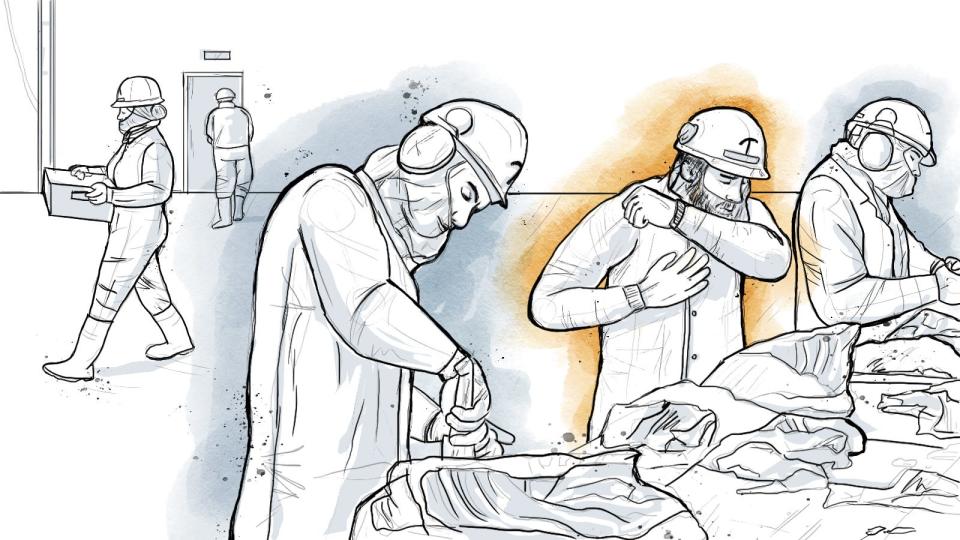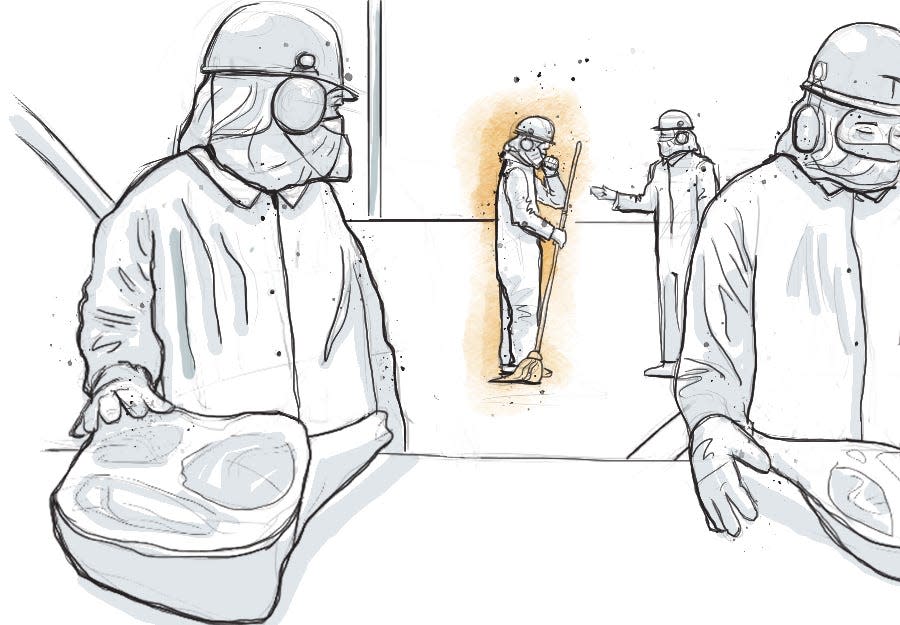OSHA faults pork plant for failing to protect workers from COVID-19, but issues no fines
Triumph Foods failed to protect its workers in the critical months leading up to a COVID-19 outbreak at its giant pork plant in St. Joseph, Missouri, last year, safety inspectors found.
At least 600 workers tested positive for the coronavirus and four have died. But the Occupational Safety and Health Administration, which conducted the inspection, did not fine the company.
The inspectors’ conclusions are in an inspection summary obtained by the Midwest Center for Investigative Reporting and USA TODAY through a Freedom of Information Act request. The document confirms much of what the news outlets reported in November: In March and April 2020, the company failed to take necessary steps to protect workers.
Triumph investigation: ‘They think workers are like dogs.’ How pork plant execs sacrificed safety for profits.
That included sending employees back to the processing line after they were tested for coronavirus but before they knew whether they’d been infected. One worker, according to OSHA’s summary, got tested and worked two more days, potentially infecting others before he learned he was positive.
He died July 9 of the virus.
"During the initial onset of the virus across the country in late March to early April the company had done very little in preparation for their facility,” the OSHA inspector wrote. “The employer should have taken a more protective approach to establish procedures and practices” to keep its employees safe from COVID-19.

U.S. Department of Labor spokesman Allen Scott said he could not comment on why the plant was not fined.
“Each case is determined on its own merits,” he said in a statement. “It is the agency’s policy not to discuss determinations beyond what is included in the case file.”
According to the summary, the company:
Did not require masks until late April, about the time positive cases were confirmed in the plant, and it didn’t train workers on how to properly use masks until May 21, about a month later.
Ordered the wrong kind of thermometers, delaying when it could start screening workers for symptoms.
Did not stagger break and lunch times, like other plants did, to allow workers to space out. A tent it set up outside so workers could social-distance was primarily used by smokers, a company executive told OSHA.
In a statement, Triumph spokesman Cole McMillian said the company has prioritized the “health and safety of our team members, their families and our community through the COVID-19 pandemic.”

McMillian took issue with USA TODAY and the Midwest Center’s previous reporting, which, like the OSHA inspection, found that Triumph Foods was slow to act to protect its employees from COVID-19.
Although he cited no factual error in the story, McMillen claimed reporters asked questions "based on factually inaccurate suppositions, and we provided a factual timeline of what actually happened. Triumph Foods stands by our prior statements and our actions, including our compliance with OSHA and CDC guidelines.”
OSHA opened its inspection into Triumph Foods on May 1 and shared its findings with the company in August. During the time, three workers died – including two within a week of each other in July. A fourth worker, who fell ill in May, died in October.
Although the inspector did not visit the plant in person, the remote inspection found several “hazard(s) and concerns.”
In August, OSHA officials met with Triumph management and discussed the findings of the inspection, according to the summary. When reporters from USA TODAY and the Midwest Center reached out to the company in early October, a company spokesman said that Triumph was “early” and “proactive” in protecting workers.
“Our response was swift, well documented, covered in the media, and used as industry guidance for effective best practices nation-wide,” he said in an Oct. 2 email.
Debbie Berkowitz, a former OSHA chief of staff and senior policy adviser and now director of the National Employment Law Project’s worker health and safety program, cast the summary as part of a failure by OSHA under former President Donald Trump’s administration to protect workers.
As in Triumph’s case, the agency failed to inspect work sites in-person and closed the overwhelming majority of cases without issuing citations or penalties, Berkowitz said.
“OSHA abandoned its mission. It abandoned responsibility to protect workers,” Berkowitz said. “It clearly saw hazards. It clearly saw workers exposed to hazards that can cause serious physical harm and death, and they did nothing. They gave the company a pass. They gave the whole industry a pass, and they gave 13,000 other employers a pass where workers filed complaints.”
More than 45,000 positive COVID-19 cases have been linked to meatpacking plants, and at least 240 workers have died, according to Midwest Center tracking. That is likely an undercount with meatpacking companies, including Triumph, clamping down on releasing information about cases in their plants.

When asked Wednesday for an updated number of positive cases tied to Triumph Foods, the Missouri Department of Health and Senior Services said, “there has not been further formal tracking by public health since the original outbreak.”
As of February, the latest that data is available, OSHA was still receiving COVID-19 complaints about meatpacking plants across the country.
A year ago, as the pandemic was just getting started, Triumph managers knew their facility was at “particular risk” for a COVID-19 outbreak, according to the inspection summary. Plant executives had been in communication with other plants’ leadership, and they had seen news stories about outbreaks at meatpacking plants. It was “only a matter of time” until the virus entered the facility.
When the plant started screening employees for high temperatures on April 13, it was only on a voluntary basis “to ease employees into the process,” a Triumph executive told the OSHA inspector according to the report. It wasn’t mandatory until three days later.
At that time, workers were already talking among themselves about cases in the plant, and a later state review would prove them correct. A Triumph executive told the local health department that the plant had a rash of strep throat, not COVID-19, cases.
Procuring thermometers proved difficult for the company. After four thermometers arrived at the plant, Triumph had to order different devices because the purchased ones “were not applicable to the use they intended,” the summary said.
The company’s policies on masks also shifted in the outbreak’s early days. During the first week of April, the Centers for Disease Control and Prevention recommended that everyone wear masks in public. On April 16, Triumph emailed its employees and said that masks were not mandatory, according to the summary.
At a mass-testing event during the last week of April, Triumph allowed workers to return to the processing line before knowing whether they were positive, including the worker who died July 9.
Another worker, Arturo Chavez Valencia, 44, was the first of four Triumph workers to die from COVID-19. He tested positive April 22, two days after his last day at work. He worked on the same line as the first two people to test positive, the news outlets found.
“It was determined that (Chavez) could have come into contact with (the) original two employees or others that had been in contact with them,” the OSHA summary said.
OSHA investigated whether his death was work-related but could not make a determination either way, an agency spokesman said. If it had been found to be work-related, it could have led to a fine.
During the inspection, company executives admitted to OSHA that the spread among its employees could have happened in the plant.
“The company stated that they believe that spread of the virus was occurring outside of the facility, but cannot rule out the possibility that some spreading was occurring in the facility as well,” the inspector wrote. “Other employee(s) and managers interviewed said much of the same and indicated that the spread could have come from contact with other workers at the facility.”
The inspection summary also pointed to “gaps” in Triumph’s effort to space out workers – one of the primary recommendations from the guidelines for meatpacking plants created by the CDC and OSHA.
Workers could not remain 6 feet apart in locker rooms and the cafeteria, the inspector found. Many other plants staggered break and lunch times so fewer workers could congregate, but, according to the summary, Triumph did not do so.
The plant installed a tent outside where workers could go to spread out. However, it was barely used, because Triumph didn’t mandate its use, and it didn’t give workers extra time to walk outside, USA TODAY and the Midwest Center found in their investigation.
The OSHA inspector noted that, too: “When asked how much it was being used by employees,” reads the summary, a Triumph executive “stated only primarily by the smokers.”
Under Trump, OSHA took a hands-off approach to the meatpacking industry. The agency did not inspect every plant that employed a worker who died of COVID-19, and, out of the hundreds of plants with outbreaks, only a handful have been fined.
Last year, as thousands of workers tested positive and dozens died, the industry pressured the federal government to keep plants open. At one point, the industry’s lobbying arm, the North American Meat Institute, submitted a draft executive order that would keep plants operational, and similar language was included in the executive order Trump signed a week later.
President Joe Biden instructed OSHA, on his second day in office, to study whether it should implement an emergency temporary standard, which unions and labor experts said would make it easier to hold employers accountable. Biden gave the agency until Monday to decide whether to issue a standard.
This article originally appeared on USA TODAY: COVID outbreak hit pork plant where OSHA found few worker protections

